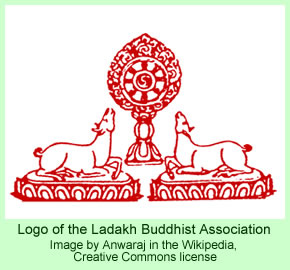Tensions in Ladakh over the fact that Muslims are producing more babies than Buddhists bubbled to the surface once again last week. The Ladakh Buddhist Association (LBA) sent a letter to the Prime Minister of India, Narendra Modi, plus other officials protesting what it calls a “love jihad” by Muslims.
A journal article by Sara H. Smith, reviewed in 2014, pointed out that interfaith marriages in Ladakh had historically been permissible by both communities. In such unions, Buddhist and Muslim men and women adhered to their own faiths, yet they cherished the harmony of the overall Ladakhi community as they attended each other’s sacred festivals and respected their differing traditions. However, the interfaith harmony was severely challenged by strife and violence in the late 1980s, and groups such as the LBA have forbidden such marriages since then.
An earlier article, also by Smith, described how the fanaticism of Ladakhi religious leaders, especially the LBA, was leading them to not only try and prevent interfaith marriages, but also to try and discourage Buddhist women from making their own decisions on the sizes of their families. The LBA made it seem like a sacred duty for Buddhist women to marry Buddhist men, and to then produce more and more babies.
The most recent letter from the LBA was described in a news article last week published by Rising Kashmir, a major daily newspaper in the state of Jammu and Kashmir. The letter restated the LBA position—their absolute opposition to interfaith marriages: “Buddhist girls have been lured by [the] Sunni Muslim community in Zanskar forcing them to embrace Islam. Young girls are being lured by Muslim boys to marry and [then they] finally convert them to Islam,” the LBA wrote.
Zanskar, a subdivision of the Kargil District, is composed of Sunni Muslims and Buddhists. The people living in the rest of Kargil are mostly Shia Muslims, while the Leh District is predominantly Buddhist with a minority of Muslims. The LBA letter claimed that Muslim activities had converted some Buddhists to Islam, “which ignited resentment and anger among the Buddhist community all over Ladakh.”
The letter described specific incidents late in 2014 and early in 2015 in which Buddhist females were lured away from their families by Muslims. The LBA appealed to Prime Minister Modi to intervene. As yet, it said, no arrests had been made.
The letter, signed by Sonam Dawa, the General Secretary of the LBA, warned that serious intercommunity tensions would be the result if the situation is not stopped, and government officials would be at fault. For their part, Ladakhi Muslims are denying that they are perpetrating any forceful conversions. Representatives of their community protest that the Buddhists are the ones who are enforcing a social boycott against them.
Ghulam Rasool, a retired Muslim official, said that Muslims form only a minority in the Zanskar region, and they have no reason to try and convert anyone. He admitted that some Muslim and Buddhist young people do marry one another, but he asked the obvious question: “so what role does the whole community play in it?” He concluded that the social boycott is basically at fault, and if individuals convert from one faith to another, isn’t that their own, private business?
The Rising Kashmir journalist, Rahiba Parveen, did not indicate if she made any attempt to find out how the LBA letter was viewed by Prime Minister Modi, but she did contact the local Member of Parliament, Thupstan Chhewang. He said that these issues have been brought to his attention. He mentioned that 20 to 24 families had been converted a couple years ago. “Ladakh has been very peaceful but such isolated incident[s] could lead to tension,” he said.
